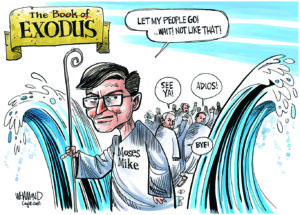With Big Ideas Like These…
Republicans almost suffered strokes over Hillary Clinton's health insurance plan. Now that the screams of outrage have subsided, a close examination reveals that the GOP alternatives are either nonexistent or unworkable.WASHINGTON — Now that the hubbub over Hillary Clinton’s health insurance plan has temporarily subsided, that silence you hear is the sound of Republican presidential candidates offering their own alternatives to finally cover all of the country’s 47 million uninsured men, women and children.
What, you don’t hear them?
The newfangled Republican idea about how to fix the broken health insurance system is as old as Hooverism. In fact, if you liked President Bush’s plan to change Social Security from a system of guaranteed benefits to an uncertain scheme in which individuals would fund their own retirement through private investment accounts, then you’ll love how proposed Republican tax cuts for health insurance would work.
Basically, the emerging Republican idea about health insurance is the same as the party’s idea about everything else: Take any problem that is large and complex and solve it with a tax cut. In essence, the GOP would do away with the employer-based system of health insurance and put in its place a system of tax breaks for individuals who would then supposedly have enough money — not to mention negotiating skills — to buy their own coverage and get a better deal from the insurance industry. The leading Republican contender, Rudy Giuliani, has been the most vocal about this approach, but others embrace it as well.
Eliminating employer-based insurance and bestowing upon individuals a tax cut with which they buy insurance is supposed to miraculously tip the healthcare balance in favor of consumers. The presumed increase in competition would theoretically lower prices.
Now, anyone who’s ever called an insurance company to protest the denial of a claim knows just how much power the individual consumer wields. And neither Giuliani nor any other Republican has spelled out a method for keeping companies from selling policies only to the healthiest. Nor do they seek to block the industry from charging higher rates to those who are elderly or have chronic ailments or a sick child.
The Employee Benefit Research Institute studied the approach and found there would be some gain in abandoning the employment-based system: Such a change would at least recognize the degree to which the workplace-based structure is crumbling and many workers whose employers currently offer only one plan would see greater choice.
But the benefits group — which is funded largely by corporate sponsors, including big insurance companies — says that because of insurance industry consolidation, “increased choice may simply mean that individuals have more plans to choose from; competition among insurers may not increase.” That is, prices wouldn’t necessarily drop.
And, of course, the benefit of having employers purchase insurance for groups of workers would be lost. Individuals would be thrown into what the research institute calls the “dysfunctional individual insurance market,” in which the industry seeks to avoid covering those most at risk of getting sick. The price discounts and coverage advantages of spreading the risk among all employees at a company would be lost. So would the leverage that employers have when they advocate for workers during disputes over claims. “Insurers are more likely to respond to an employer than to an individual because of the risk of losing a large group contract,” the researchers concluded.
But what about reducing the number of uninsured? The tax changes promoted earlier this year by Bush — and mimicked by Giuliani — simply wouldn’t be great enough to offset the high cost of premiums. “Hence, it should come as no surprise that the number of uninsured would remain at or above 40 million,” says the EBRI.
So here’s how this all would work: The risk and cost of insurance would be shifted to individuals, with little, if any, reduction in premiums and other healthcare costs. But there still would be little progress toward insuring the uninsured.
Republicans offer this grand bargain while simultaneously hyperventilating over “Hillarycare” and “socialized” medicine and dark predictions that those nefarious European-inspired bureaucrats — mon Dieu, perhaps even the French! — will destroy that icon of American virtue, the insurance industry.
The rhetoric is false. None of the leading Democratic presidential contenders proposes a federally run system — such as Medicare — to solve the coverage dilemma. If anything, most current Democratic plans are weaker than anything the party has offered since Harry Truman proposed national health insurance.
But as usual, the Republican political noise serves a larger purpose. It distracts from the ugliness of GOP alternatives that fail to expand coverage and would probably make those who do have it worse off than they are now.
Marie Cocco’s e-mail address is mariecocco(at)washpost.com.
© 2007, Washington Post Writers Group
Your support matters…Independent journalism is under threat and overshadowed by heavily funded mainstream media.
You can help level the playing field. Become a member.
Your tax-deductible contribution keeps us digging beneath the headlines to give you thought-provoking, investigative reporting and analysis that unearths what's really happening- without compromise.
Give today to support our courageous, independent journalists.






You need to be a supporter to comment.
There are currently no responses to this article.
Be the first to respond.